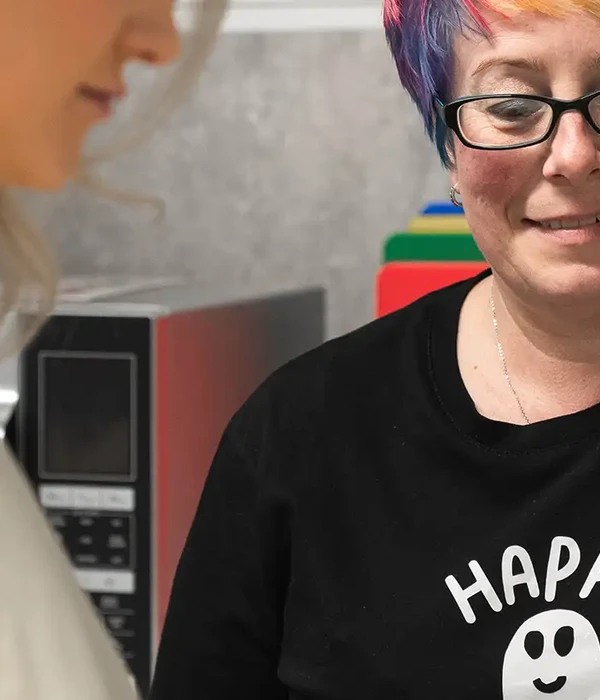Zolpidem Addiction Treatment
Zolpidem is a prescription drug used to treat sleeping problems like insomnia. It works by affecting chemicals in the brain, helping you fall asleep faster. While it is helpful in the short term, zolpidem can lead to addiction if not used as directed.
You may notice signs of sleeping pill addiction, such as needing higher doses to sleep, strong cravings, or feeling unwell when not taking the drug. If you or someone you care about is struggling, support is available through prescription drug addiction treatment programmes.

Take the First Step Towards Recovery
Steps Together offers personalised support and proven treatments, providing the care, guidance and encouragement you need to move forward with confidence and build a healthier future.

Understanding Zolpidem
Zolpidem, commonly sold under brand names like Ambien and Edluar, is a sedative-hypnotic medication. It is part of a group of medicines known as z-drugs, which are designed to help with sleep disorders. With around 1 in 5 people not getting enough sleep, many may turn to medications like zolpidem to get the rest they need.
Doctors often prescribe zolpidem for those who have trouble falling asleep. It is meant for short-term use and is available in several forms, including tablets and sublingual tablets. You should use zolpidem only as your doctor advises because misuse can cause problems.
How Zolpidem Works
Zolpidem works by binding to special sites on the GABA-A receptors in your brain. These receptors help calm the brain’s activity. By boosting the effect of the chemical GABA (gamma-aminobutyric acid), zolpidem reduces brain activity, making it easier to fall asleep.
This medicine acts quickly, usually within 30 minutes. That is why you should take it right before going to bed. While zolpidem is effective for dealing with insomnia, it does not treat the main causes of poor sleep and should not be used for long periods without a doctor’s guidance.


Is Zolpidem Addictive?
Zolpidem has a high potential for misuse, especially if you use it longer than prescribed or at higher doses. Your body can become used to the medicine, causing you to need more of it to get the same effect. This is called tolerance.
With ongoing use, physical and psychological dependence can develop. Signs of addiction may include craving the medicine, feeling unable to sleep without it, or taking more than directed.
Zolpidem Rehab Treatment
Zolpidem addiction recovery often involves more than just stopping the drug. Effective treatment addresses both physical withdrawal and the underlying behaviours or thoughts that lead to dependence.
Zolpidem Detox
The first step in zolpidem addiction treatment is detox. This process safely removes zolpidem from your body while minimising withdrawal symptoms. Medical supervision is important during detox because stopping suddenly can lead to dangerous side effects like seizures, confusion, or insomnia.
A controlled environment helps you manage cravings and physical symptoms. In some detox programmes, doctors may gradually lower your dose to reduce discomfort. Clinics focus on keeping you comfortable and safe, allowing your body and mind to stabilise before moving on to further treatment.
Behavioural Therapies in Zolpidem Addiction Treatment
Behavioural therapies focus on changing the thoughts and behaviours that lead to zolpidem abuse. Cognitive-behavioural therapy (CBT) is a proven technique that helps you identify triggers, manage cravings, and learn coping skills.
Dialectical behaviour therapy (DBT) can be useful if you have co-occurring mental health issues or extreme emotional responses. Other helpful therapies include motivational interviewing, which increases your desire to change and live without zolpidem.
Residential and Outpatient Rehab
Zolpidem rehab programmes can be inpatient or residential and outpatient. Residential rehab means you live at the clinic for several weeks, receiving constant support. This environment removes you from triggers and daily stresses, making relapse less likely.
Outpatient rehab allows you to attend therapy sessions and treatment for addiction to zolpidem during the day but return home in the evenings. Outpatient treatment may suit people with mild dependencies or strong support systems at home.
Individual and Group Therapy
Individual counselling gives you one-on-one time with a therapist to address the personal reasons behind your zolpidem use. This private space lets you explore your history, set goals, and work on specific problems that may be fuelling your addiction.
Group therapy connects you with others facing similar challenges. Sharing your experiences and listening to others helps reduce feelings of isolation and shame. Group sessions also build important social skills and provide motivation.
Other prescription drug addictions we treat

Zolpidem Addiction Symptoms
You may notice you need higher or more frequent doses of zolpidem to fall asleep, which is a sign that your body has developed a tolerance. This usually means the original prescribed amount no longer has the same effect on your sleep problems. Some users experience withdrawal symptoms such as sweating, shakiness, nausea, irritability, or even anxiety if they miss a dose.
Other psychological effects can include mood swings, confusion, memory problems, or feeling disconnected. Many people also report experiencing rebound insomnia, their sleep issues return and may be stronger than before once they stop taking zolpidem.
Behavioural Indicators
Behavioural changes are common in substance use disorders. You might find yourself taking zolpidem in secret, using it at inappropriate times, or running out of your prescription pills too soon. It is also possible to start visiting several doctors to get new prescriptions, known as ‘doctor shopping.’
Other signs include losing interest in activities that were once important to you, or struggling at work or school. Lying about zolpidem use or hiding pill packets can become part of daily life. Being unable to quit or cut down despite knowing the harm is a key behavioural symptom of prescription drug addiction.

Effects of Zolpidem Addiction
Zolpidem addiction often causes immediate symptoms like extreme drowsiness, dizziness, and poor coordination. These effects increase your risk of falls and accidents, especially if you attempt daily activities while feeling sedated.
With long-term misuse, you may face chronic insomnia, tolerance (needing more to achieve the same effect), and physical dependence. The risks of overdose, respiratory depression, and even unconsciousness increase over time. Your body can also develop withdrawal symptoms if you suddenly stop using zolpidem.
Mental health complications frequently arise when you misuse zolpidem. Depression and anxiety may worsen, or they can begin for the first time due to addiction. Some people experience mood swings or emotional numbness. Panic attacks and a sense of being disconnected from reality are possible.
Preventing Zolpidem Relapse
Staying sober after Zolpidem addiction treatment often means facing triggers and setbacks. Success in the long run depends on a solid aftercare plan, strong personal connections, and healthy changes to how you manage daily life.
Aftercare
An aftercare programme keeps you engaged with your recovery after finishing treatment. Options may include weekly therapy sessions, regular check-ins at a clinic, or online meetings. Consistent support helps you manage triggers, cravings, and setbacks before they become serious problems.
You may have access to relapse prevention training, which gives practical skills to spot early warning signs and respond quickly. Taking part in follow-up appointments lets you measure progress and get medical help for challenges like sleep disturbances or lingering withdrawal symptoms. Programmes focused on your needs can raise your chances of long-term sobriety.
Coping Strategies and Lifestyle Changes
You need effective coping strategies to replace old habits tied to Zolpidem use. Cognitive behavioural therapy and other therapies teach you how to manage triggers, anxiety, and difficult emotions. Keeping a regular sleep schedule, practising relaxation techniques, and seeking help for ongoing sleep issues are all important steps.
Making positive lifestyle changes supports your recovery. Exercise, good nutrition, and structured activities improve your mood and general well-being. Avoid environments and situations connected to drug use whenever possible. The more you change your daily patterns, the easier it is to stay sober and reduce the risk of relapse.
Building a Support Network
A reliable support network gives you extra protection against relapse. Having people who understand your situation, like family, trusted friends, or fellow group members, means you do not have to face struggles alone. Family therapy and group sessions can also improve relationships and create a home environment that encourages healthy choices.
It helps to join peer support groups, either locally or online. Here, you can share experiences, get encouragement, and learn practical advice from others in recovery. Discussing problems and solutions with people who have faced similar challenges can make you feel less isolated, especially after treatment ends.

Zolpidem Rehab and Recovery
If you’re struggling with zolpidem addiction, it’s important to know that recovery is possible. At Steps Together, our rehab programmes are designed to help you safely overcome dependency and restore healthy sleeping patterns.
Sleep plays a vital role in maintaining your mental and physical well-being, and we’re here to help you reclaim it. Reach out to us today and take the first step toward a healthier life where you can sleep easy knowing you’re not dependent on drugs.
Frequently Asked Questions
What are the first steps in seeking help for zolpidem dependency?
You can start by speaking to your GP or a healthcare professional about your zolpidem use. They can assess your situation and refer you to an addiction specialist or treatment centre if needed.
What are the most effective therapies for managing zolpidem withdrawal symptoms?
The most effective therapies often include a gradual dose reduction under medical supervision, known as tapering. You may also benefit from behavioural therapies like cognitive behavioural therapy, counselling, and support groups.
What lifestyle changes can support recovery from zolpidem addiction?
Keeping a regular sleep schedule, avoiding caffeine at night, and staying active can support your recovery. Healthy eating and stress management techniques like mindfulness or exercise can also improve your mood and sleep quality.
Can long-term use of zolpidem lead to addiction?
Yes, using zolpidem over a long period increases the risk of developing dependence. Even if you take zolpidem as prescribed, your body can become used to it, leading to addiction symptoms such as cravings, withdrawal, and needing higher doses to get the same effect.
Are there any risks associated with abruptly stopping zolpidem?
Yes, stopping zolpidem suddenly can cause withdrawal symptoms. These may include anxiety, insomnia, confusion, and in some cases, seizures. Because of these risks, it is best to get help from a qualified professional who can guide you through safe withdrawal.
How can one identify a reliable treatment centre for zolpidem addiction?
Look for treatment centres that are registered and employ qualified staff. A reputable centre will offer comprehensive assessments and personalised treatment plans. Reading reviews and talking to past clients may also help you make an informed choice.





